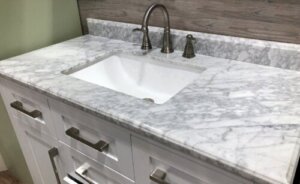Quartz Countertops: Advantages and Disadvantages

Quartz countertops attract attention due to the aesthetics they give to kitchens. They’re also highly durable, require little maintenance, and are available in a variety of colors.
To be more precise, these surfaces are made from ground particles of quartz bound together by a resin. As detailed in a publication in Mineralogical Magazine, quartz is extracted from igneous, metamorphic and sedimentary rocks. It’s used as a raw material for various industrial projects.
Now, what are the advantages and disadvantages of countertops made of this material? If you’re considering installing one at home, it’s good to answer these questions first.
Advantages of quartz countertops
A countertop is a fundamental element in every kitchen. It fulfills a relevant function, as it’s a surface that will be used daily for different tasks. In addition, it provides aesthetics and design in this area. Hence the importance of choosing an attractive, durable and easy-to-clean manufacturing material.
According to an article published in Procedia Economics and Finance, quartz is found in nature with different grades of purity. Moreover, it’s marketed in various grades for industrial applications. For this reason, it’s possible to find quartz countertops on the market. What are their advantages?

Resistant and durable
This is one of the most outstanding characteristics of this material. You could even say that it’s what leads many people to choose it, apart from the fact that it gives a good style.
Quartz usually resists stains, scratches and moderate temperatures. It’s also less prone to cracking or chipping, unless the impact is considerable.
You may be interested in: Kitchen Islands: Advantages and Disadvantages
For those who are concerned about hygiene, quartz countertops are a good choice. Because it’s a waterproof material, it prevents germs, bacteria, and other microorganisms from incubating in the surface crevices.
On the other hand, its smooth appearance makes it easier to clean and food particles don’t get trapped.
Variety
Fortunately, there’s a wide variety of colors and patterns on the market, and you’ll have a wide range to choose from. Keep in mind that a plus point of quartz is that it doesn’t discolor. Therefore, if you keep it polished and well cared for, you’ll enjoy a countertop that looks like new for a long time.
Accessible
Compared to other materials such as granite and marble, quartz is usually more economical. In addition, if you consider the other advantages we have mentioned and the price ratio, you can think of it as a good choice.
Disadvantages of quartz countertops
Despite all the advantages described, there are other reasons that you should consider before purchasing a quartz countertop for your kitchen.
They don’t resist high temperatures
As we’ve mentioned, quartz resists moderate temperatures. However, the same is not true for high temperatures. In fact, this is one of the main warnings before installation.
This is due to the materials used in its manufacture, such as resin. However, intense and prolonged heat will be necessary for the countertop to burn.
Difficult to repair in case of breakage
Although it’s a resistant material, there may be cases where it can break due to a strong blow with a heavy object. However, if the quartz countertop is damaged, it’s difficult to repair. If so, most specialists suggest replacing the surface completely.

Are quartz countertops a good choice?
Yes, if you take into account the wide variety of colors and patterns to choose from, as well as the durability, resistance and easy maintenance, they’re a good option. However, you can compare their advantages and disadvantages with other materials such as marble or granite.
If you finally decide on quartz, keep in mind that you’ll find different qualities. Some are made with mixtures of other natural stones or with industrial waste from ceramics, glass, silica, and mirrors. Try to choose combinations with stones, as they’re more resistant and durable. Don’t forget!
All cited sources were thoroughly reviewed by our team to ensure their quality, reliability, currency, and validity. The bibliography of this article was considered reliable and of academic or scientific accuracy.
- Götze, J. (2009). Chemistry, textures and physical properties of quartz — geological interpretation and technical application. Mineralogical Magazine, 73(4), 645-671. doi:10.1180/minmag.2009.073.4.645
- Platias, S., Vatalis, K. I., & Charalampides, G. (2014). Suitability of Quartz Sands for Different Industrial Applications. In Procedia Economics and Finance (Vol. 14, pp. 491–498). Elsevier BV. https://doi.org/10.1016/s2212-5671(14)00738-2
This text is provided for informational purposes only and does not replace consultation with a professional. If in doubt, consult your specialist.








